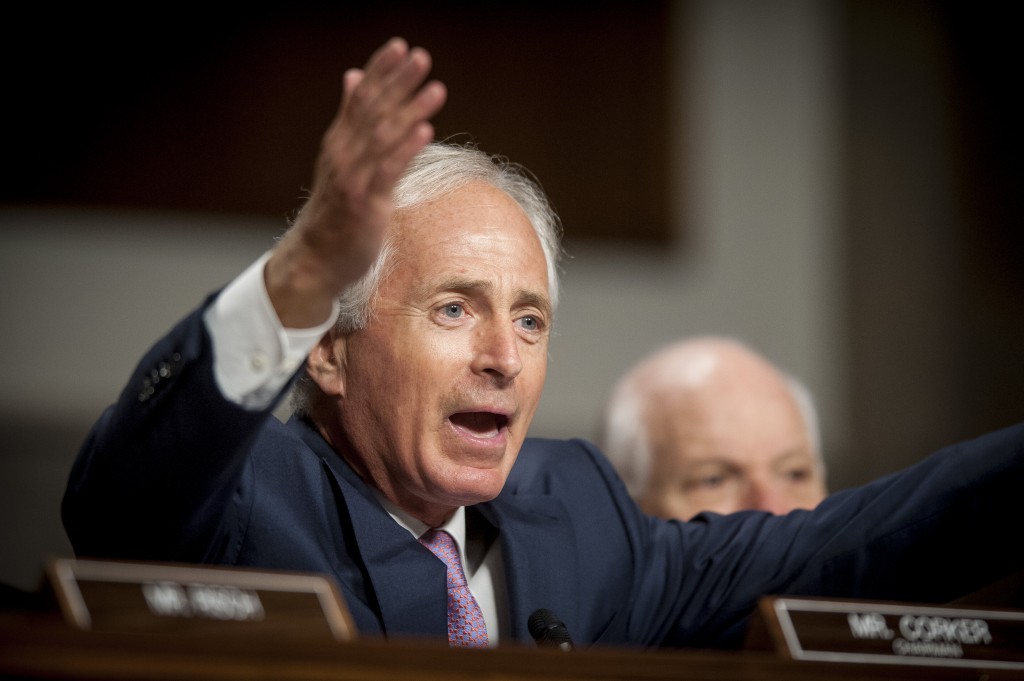John Kerry Calls Alternatives to Iran Deal ‘Unicorn’ and ‘Fantasy’
Natalie Johnson /
Secretary of State John Kerry made a heated defense of the Iran nuclear deal Thursday, saying the U.S. will face international isolation and degraded security if Congress rejects the deal.
“The diplomatic support that we have built with all these other countries, that we’ve accumulated, would disappear overnight,” Kerry said at a contentious Senate Foreign Relations Committee hearing.
Kerry said congressional rejection would give Iran a “green light” to install advanced centrifuges, double its uranium enrichment process and “proceed full speed ahead with a heavy water reactor … and do it all without the unprecedented inspection and transparency measures that we have secured.”
“Everything that we have prevented will then start taking place,” he said, noting that Iran already has extensive experience with the technology used to build a nuclear weapon. “We can’t bomb that knowledge away, nor can we sanction the knowledge away.”
He said the comprehensive accord struck in Vienna last week between Iran and the P5+1— the U.S., France, Germany, Britain, Russia and China—is the only “viable” option in limiting Tehran’s nuclear program.
“[The alternative] isn’t a better deal, some sort of unicorn arrangement involving Iran’s complete capitulation. That’s a fantasy, plain and simple,” he said.
Kerry’s testimony marks the first public hearing on the deal limiting Iran’s nuclear program in exchange for international sanctions relief. Energy Secretary Ernest Moniz and Treasury Secretary Jacob Lew joined him as witnesses.
Kerry entered the Senate chamber to applause from a group of onlookers thanking him, but the mood abruptly shifted as Sen. Bob Corker told the secretary of state that he was “fleeced” by Iran.
“You have crossed a new threshold in U.S. foreign policy—where now it is a policy of the United States to enable a state sponsor of terror to obtain a sophisticated, industrial nuclear development program that has as we know only one real, practical need,” Corker said to Kerry.

Senate Foreign Relations Committee Chairman Bob Corker said Secretary of State John Kerry was “fleeced” by Iran in the nuclear deal. (Photo: Pete Marovich/UPI/Newscom)
Kerry said the U.S. negotiated the accord with nuclear experts from other countries, noting, “they’re not dumb” and all signed the agreement in support.
Republicans criticized the deal for unilaterally lifting sanctions too quickly, eventually pouring billions of dollars into Tehran. Corker said this shifts “leverage” from the U.S. to Iran, contending if the West employs snap-back sanctions Iran could back out of its promises.
Lew addressed the criticism, saying Iran would have access to about $50 billion once sanctions are lifted, well under original estimates, and could not immediately spend the money because of debt and trade costs.
Lew also said the deal does not block the U.S. from employing sanctions over issues detatched from nuclear activity if it feels discrete sanctions are necessary.
Congress has a 60-day review period to accept or reject the deal by Sept. 17. Republicans have taken hardline positions against the deal and remained unmoved following Kerry’s testimony.
“With all due respect, you guys have been bamboozled and the American people are going to pay,” Sen. Jim Risch, R-Idaho, told the witnesses.
Kerry remained firm that the U.S. and its allies would “lose” if the accord fails to pass through Congress, rejecting the possibility of alternatives.
“If you think the Ayatollah is going to come back and negotiate again with an American, that’s fantasy,” Kerry said. “You’re never going to see that because we will have proven we’re not trustworthy.”
